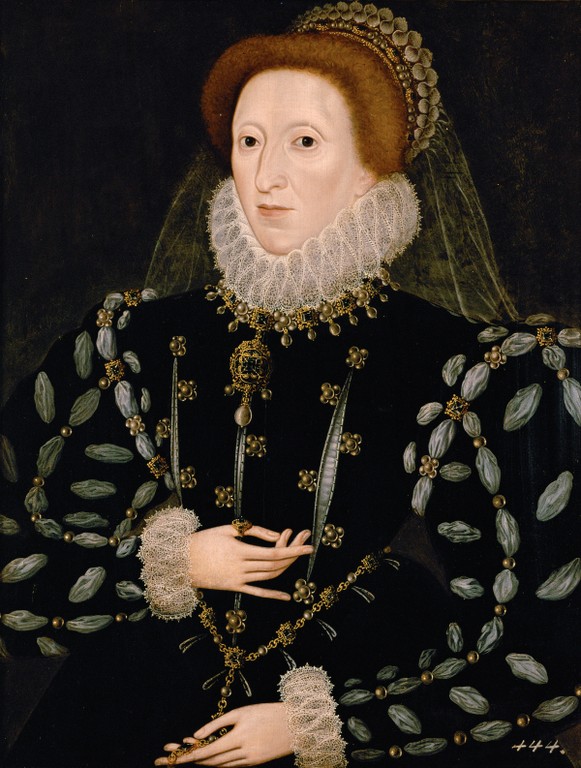
This story was updated on Monday May 4 at 10:15 a.m. E.T.
Princess Kate Middleton and Prince William just welcomed their second child, a baby girl, into the world — and into the growing queue to the British throne.
Based on custom, the baby girl will be fourth in line to the throne, after Prince Charles, Prince William and Prince George. That makes it somewhat unlikely that she will ever become queen.
Historically, the first-born son typically inherited the property and titles, while the second-born son or daughter was groomed for other pursuits, such as the military. Most second sons and daughters went on to bigger things only if the eldest child died. But that doesn't mean the new royal baby isn't destined for greatness, like big brother George. From Henry VIII to Richard the Lionheart, here are some younger siblings who changed history.
1.King Henry VIII
King Henry VIII, who ruled England from 1509 to 1547, ascended to the throne only because his elder brother, Arthur, died in 1502. Henry VIII is perhaps most famous for his series of marriages — six in total, four of which ended with the divorce or beheading of his partner, according to "The Six Wives of Henry VIII" (The Bodley Head, 1991). The Tudor monarch then married his older brother's widow, Catherine of Aragon, but after many years without siring a healthy male heir, Henry began to wonder whether his marriage was cursed because it violated biblical laws against marrying relatives, according to "Queen Elizabeth I" (The British Library, 2006). Henry became convinced his marriage was invalid, though the Pope in Rome refused to grant an annulment. The king's battle with the Catholic Church would lead to the innovation of divorce and to the founding of the Church of England. [Gallery: The Search for Richard III's Remains]
2. Queen Elizabeth I
Sign up for the Live Science daily newsletter now
Get the world’s most fascinating discoveries delivered straight to your inbox.

Queen Elizabeth I, one of the longest-reigning monarchs in England, was actually Henry VIII's second-surviving daughter, from his second wife, Anne Boleyn. On top of the scandal surrounding her parents' marriage, on the heels of King Henry's annulment of his first marriage, Elizabeth was a female — the less favored sex for a royal heir. In addition, her birthdate, Sept. 7, 1533, led to lifelong questions about her legitimacy, as she was born just 7.5 months after her parents were married, according to "Queen Elizabeth I." Despite her rocky beginnings, Elizabeth I would go on to greatness. She reversed her sister Mary's restoration of Catholicism in England. With the help of notorious pirate Sir Francis Drake, she defeated the Spanish Armada at sea. She also supported some of England's first colonial forays: She approved Sir Walter Raleigh's plan to found the colony Roanoke, off present-day North Carolina's coast, and she gave the charter for the first British venture in India, the East India Company. When she died in 1603, she had ruled England for 45 years, during which time the arts also flourished, and a little-known playwright, William Shakespeare, made his mark upon the world, according to the book.
3. Richard the Lionheart
The second son of power couple Eleanor of Aquitaine and Henry II, Richard I ascended to the throne in 1189, after he and his squabbling siblings pushed their father to an early grave. However, Richard I soon earned his moniker for bravery on the field. For instance, he pushed the Third Crusade to take control of the Holy Land, though he fell short of capturing the most valuable prize, Jerusalem, according to "Warriors of God: "Richard the Lionheart and Saladin in the Third Crusade" (Anchor, 2002). Unfortunately, King Richard proved a better soldier than leader; he left the royal coffers in a dismal state when he died from a crossbow wound in Châlus, France, in 1199. He also left the country in the hands of his younger brother John, whose harsh taxation inspired the nobility to force the king to sign the Magna Carta, an agreement that limited the rights of kings.
4. George V
George V, who reigned from 1910 to 1936, ascended to the throne because elder brother, Albert Victor, died of pneumonia as a young adult. At the time, George's grandmother, Queen Victoria, was still on the throne. George V was a quiet homebody who enjoyed rousing pursuits such as stamp collecting. He earned the respect of his people by visiting the front lines of the war during World War I, according to the BBC.
5. Philip II of Macedon
Second siblings aren't the only ones who have a shot at greatness; sometimes, the third time's the charm. After the death of Amyntas III, the king of Macedon, Philip'stwoolder brothers, Alexander II and Perdiccas III, tried to fight off scores of enemies rather unsuccessfully. During that period of upheaval, Philip II was being held as a prisoner in Thebes, Greece. But the younger brother wasn't just twiddling his thumbs under house arrest; between 368 B.C. and 365 B.C., he soaked up knowledge on military strategy and technique from one of the greatest military powers in the world at the time. When Philip II was freed, he immediately came to the aid of his brother Perdiccas, who was ultimately killed in a battle. When Philip II ascended to the throne at age 21 in 359 B.C., the kingdom was in complete disarray. He managed to turn around the fortunes of Macedonia through his multiple marriages and military conquests, and went on to father one of the most famous men in history, Alexander the Great. In 336 B.C., while attending his daughter's wedding banquet, Philip II was assassinated by one of his bodyguards.
This story was updated to reflect that the King's Speech portrayed the life of George VI, not George V.
Follow Tia Ghose on Twitter and Google+. Follow Live Science @livescience, Facebook & Google+. Originally published on Live Science.

Tia is the managing editor and was previously a senior writer for Live Science. Her work has appeared in Scientific American, Wired.com and other outlets. She holds a master's degree in bioengineering from the University of Washington, a graduate certificate in science writing from UC Santa Cruz and a bachelor's degree in mechanical engineering from the University of Texas at Austin. Tia was part of a team at the Milwaukee Journal Sentinel that published the Empty Cradles series on preterm births, which won multiple awards, including the 2012 Casey Medal for Meritorious Journalism.









